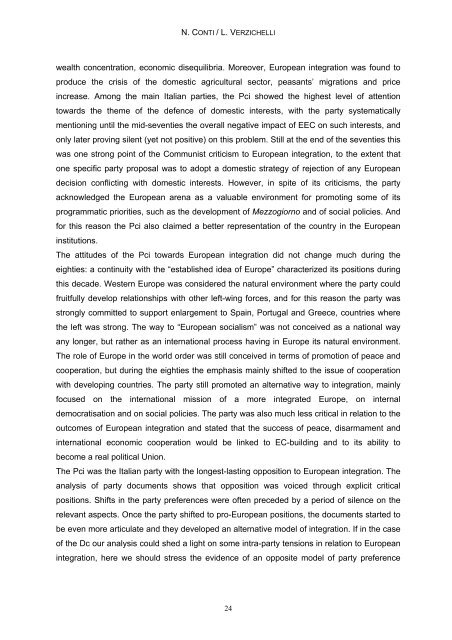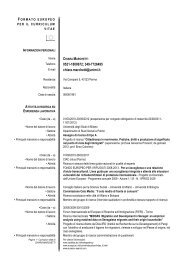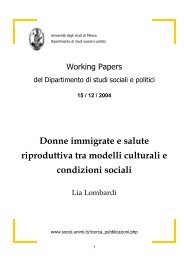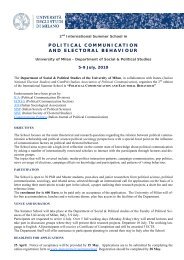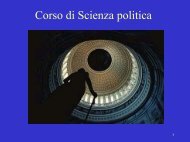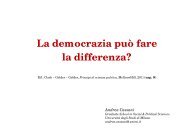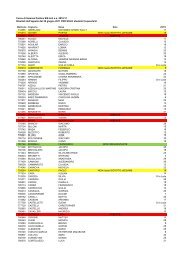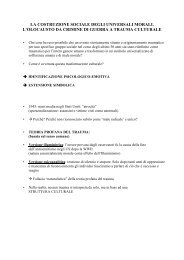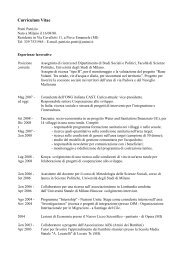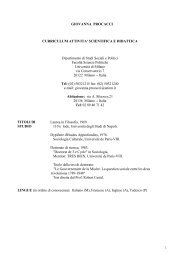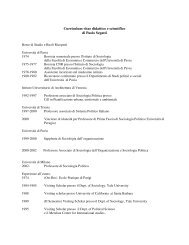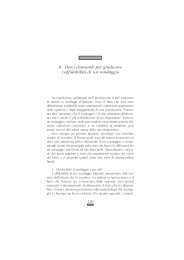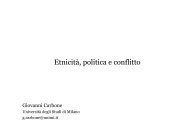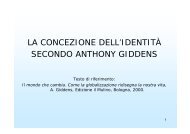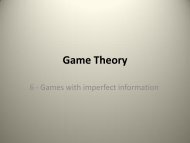The european dimension of political discourse in Italy. A ... - CIRCaP
The european dimension of political discourse in Italy. A ... - CIRCaP
The european dimension of political discourse in Italy. A ... - CIRCaP
You also want an ePaper? Increase the reach of your titles
YUMPU automatically turns print PDFs into web optimized ePapers that Google loves.
N. CONTI / L. VERZICHELLI<br />
wealth concentration, economic disequilibria. Moreover, European <strong>in</strong>tegration was found to<br />
produce the crisis <strong>of</strong> the domestic agricultural sector, peasants’ migrations and price<br />
<strong>in</strong>crease. Among the ma<strong>in</strong> Italian parties, the Pci showed the highest level <strong>of</strong> attention<br />
towards the theme <strong>of</strong> the defence <strong>of</strong> domestic <strong>in</strong>terests, with the party systematically<br />
mention<strong>in</strong>g until the mid-seventies the overall negative impact <strong>of</strong> EEC on such <strong>in</strong>terests, and<br />
only later prov<strong>in</strong>g silent (yet not positive) on this problem. Still at the end <strong>of</strong> the seventies this<br />
was one strong po<strong>in</strong>t <strong>of</strong> the Communist criticism to European <strong>in</strong>tegration, to the extent that<br />
one specific party proposal was to adopt a domestic strategy <strong>of</strong> rejection <strong>of</strong> any European<br />
decision conflict<strong>in</strong>g with domestic <strong>in</strong>terests. However, <strong>in</strong> spite <strong>of</strong> its criticisms, the party<br />
acknowledged the European arena as a valuable environment for promot<strong>in</strong>g some <strong>of</strong> its<br />
programmatic priorities, such as the development <strong>of</strong> Mezzogiorno and <strong>of</strong> social policies. And<br />
for this reason the Pci also claimed a better representation <strong>of</strong> the country <strong>in</strong> the European<br />
<strong>in</strong>stitutions.<br />
<strong>The</strong> attitudes <strong>of</strong> the Pci towards European <strong>in</strong>tegration did not change much dur<strong>in</strong>g the<br />
eighties: a cont<strong>in</strong>uity with the “established idea <strong>of</strong> Europe” characterized its positions dur<strong>in</strong>g<br />
this decade. Western Europe was considered the natural environment where the party could<br />
fruitfully develop relationships with other left-w<strong>in</strong>g forces, and for this reason the party was<br />
strongly committed to support enlargement to Spa<strong>in</strong>, Portugal and Greece, countries where<br />
the left was strong. <strong>The</strong> way to “European socialism” was not conceived as a national way<br />
any longer, but rather as an <strong>in</strong>ternational process hav<strong>in</strong>g <strong>in</strong> Europe its natural environment.<br />
<strong>The</strong> role <strong>of</strong> Europe <strong>in</strong> the world order was still conceived <strong>in</strong> terms <strong>of</strong> promotion <strong>of</strong> peace and<br />
cooperation, but dur<strong>in</strong>g the eighties the emphasis ma<strong>in</strong>ly shifted to the issue <strong>of</strong> cooperation<br />
with develop<strong>in</strong>g countries. <strong>The</strong> party still promoted an alternative way to <strong>in</strong>tegration, ma<strong>in</strong>ly<br />
focused on the <strong>in</strong>ternational mission <strong>of</strong> a more <strong>in</strong>tegrated Europe, on <strong>in</strong>ternal<br />
democratisation and on social policies. <strong>The</strong> party was also much less critical <strong>in</strong> relation to the<br />
outcomes <strong>of</strong> European <strong>in</strong>tegration and stated that the success <strong>of</strong> peace, disarmament and<br />
<strong>in</strong>ternational economic cooperation would be l<strong>in</strong>ked to EC-build<strong>in</strong>g and to its ability to<br />
become a real <strong>political</strong> Union.<br />
<strong>The</strong> Pci was the Italian party with the longest-last<strong>in</strong>g opposition to European <strong>in</strong>tegration. <strong>The</strong><br />
analysis <strong>of</strong> party documents shows that opposition was voiced through explicit critical<br />
positions. Shifts <strong>in</strong> the party preferences were <strong>of</strong>ten preceded by a period <strong>of</strong> silence on the<br />
relevant aspects. Once the party shifted to pro-European positions, the documents started to<br />
be even more articulate and they developed an alternative model <strong>of</strong> <strong>in</strong>tegration. If <strong>in</strong> the case<br />
<strong>of</strong> the Dc our analysis could shed a light on some <strong>in</strong>tra-party tensions <strong>in</strong> relation to European<br />
<strong>in</strong>tegration, here we should stress the evidence <strong>of</strong> an opposite model <strong>of</strong> party preference<br />
24


